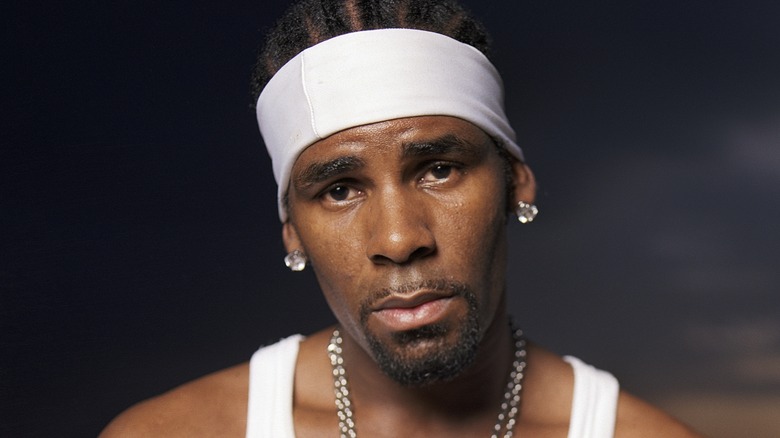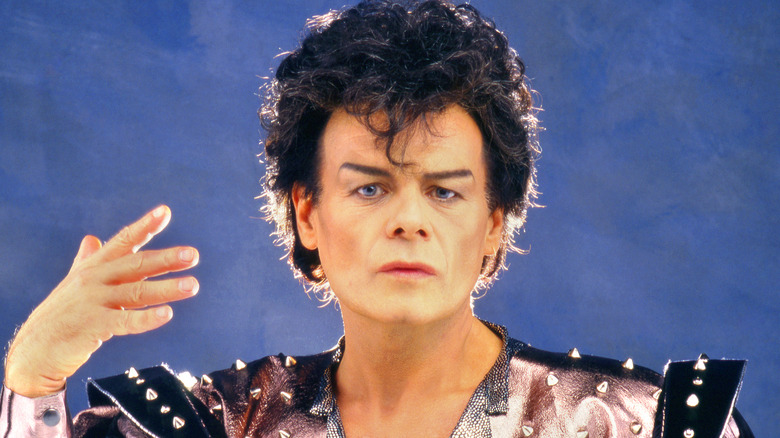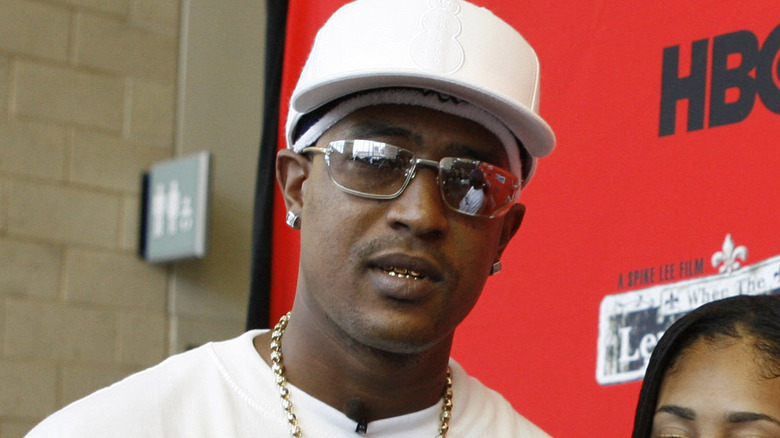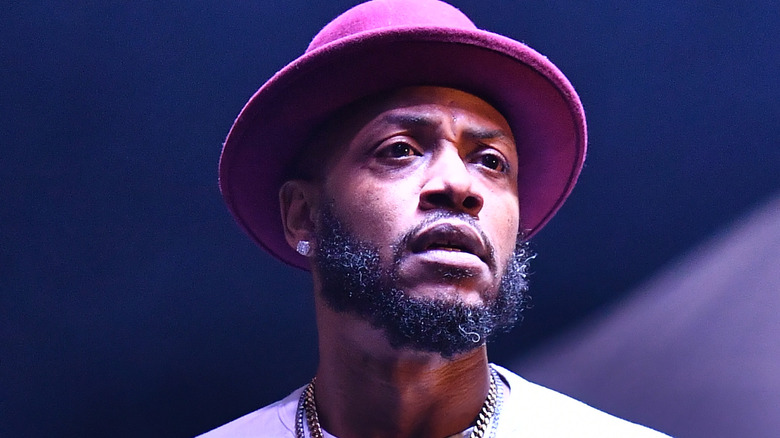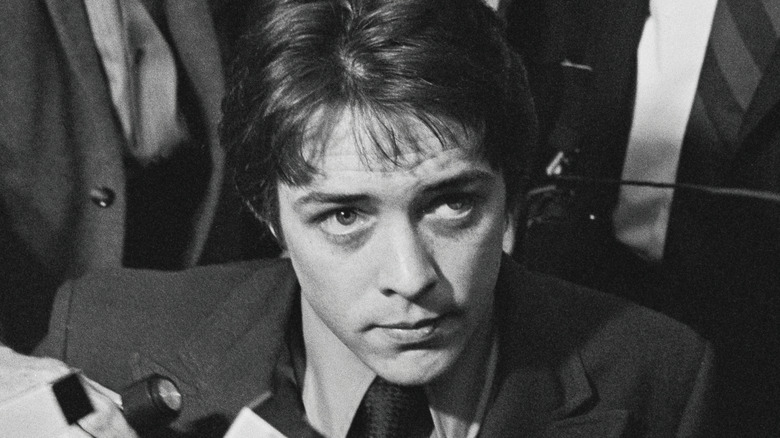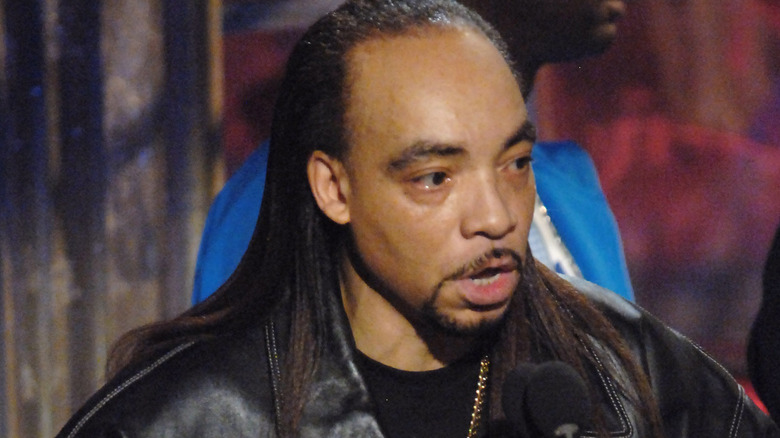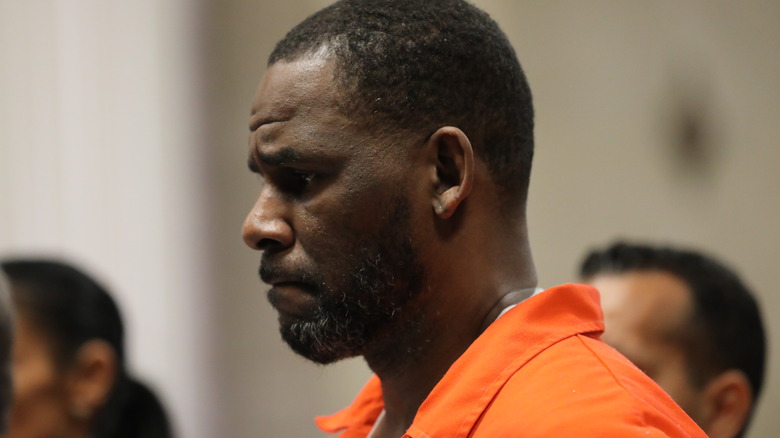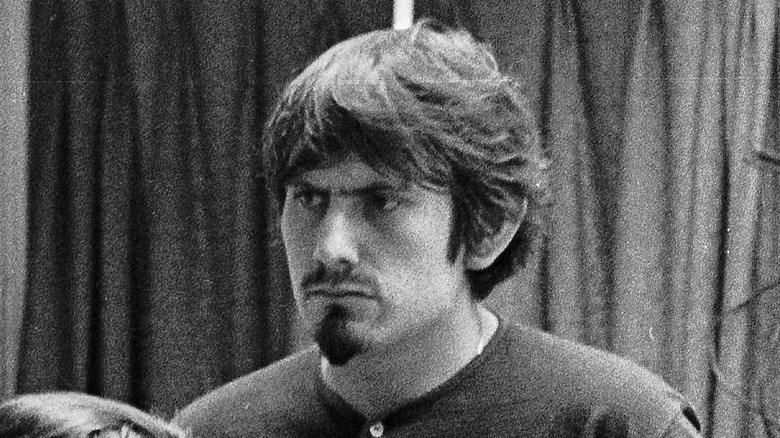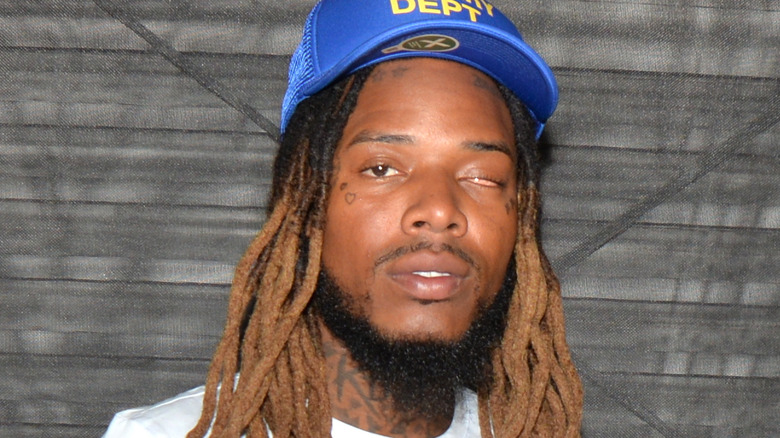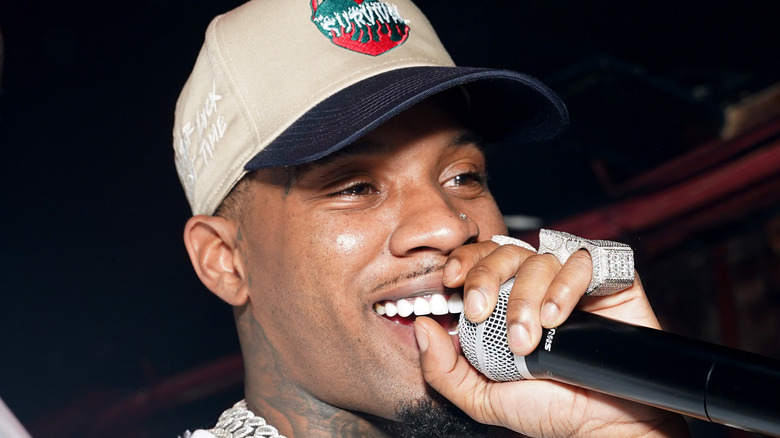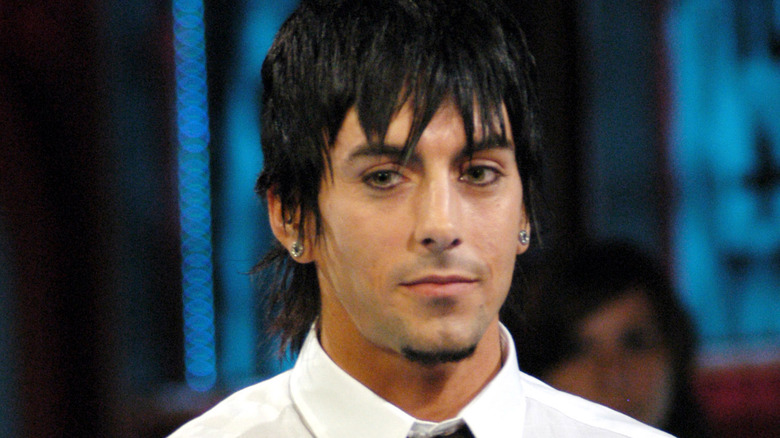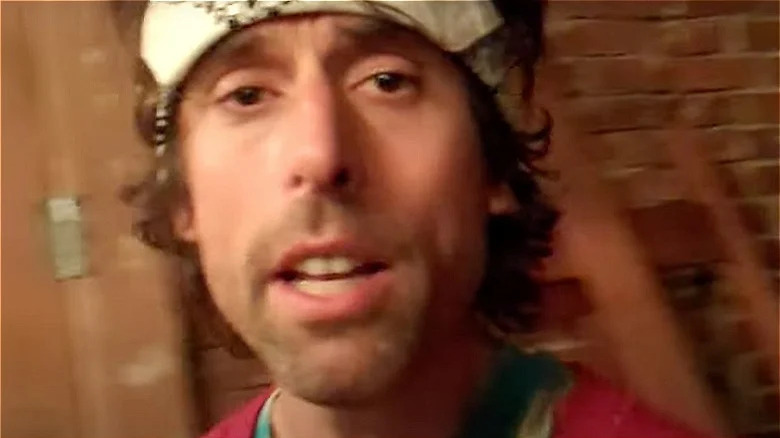Musicians Who Are Currently In Prison
Professional, famous, and successful musicians live big lives and, usually, good lives, weaving artistic and moving tales of the human experience — and it's their familiarity with the dark side of life that can get them in trouble with the law and removed from society for a while. They wax or code brilliant works of art that make the world happy, feel something, or want to dance. But some of those same beloved and influential musicians, be they rock stars, rappers, or instrumentalists, have also been known to commit heinous criminal acts that make the world around them, or life for their victims, significantly worse. Musical ability and accolades couldn't save them from police, prosecutors, or judges, either, as they've received long and difficult-to-serve punishments for those aggressive digressions.
Here are some of the most notable popular musicians who have been arrested over the last few years and decades, and how they're still sitting in prison cells paying their court-ordered debt to society.
WARNING: The following article includes allegations of domestic abuse, child abuse, and sexual assault.
Gary Glitter
In name, image, and practice, Gary Glitter embodied the 1970s movement of glam rock, before its tragic death. In his native U.K., he'd take 18 songs to the Top 40 of the pop chart, including the song he's best known for in the U.S. — the stomping "Rock and Roll (Part 2)," often played during sporting events at arenas and stadiums to excite fans. The primarily instrumental tune faded from use in the 2010s after Glitter's multiple arrests and continued imprisonments for crimes of a sexual nature committed against children.
After computer repair workers found images depicting child abuse on Glitter's PC, the musician was reported to authorities, and he subsequently served four months in prison. Upon release, Glitter emigrated to Vietnam, where, in 2006, the already convicted offender was sentenced to three years in prison for acts perpetrated against girls aged 10 and 11 in that country. When his term was almost up, the Vietnamese government deported Glitter to the U.K., where he acquired another prison sentence, this time for 16 years, for the abuse and assault of three women under the age of 18 committed in the 1970s and '80s.
Glitter was paroled in 2023, but would be remanded back into custody just 38 days later. In a violation of his parole, Glitter was caught using an internet-enabled device to try to access illegal sexual content on the dark web.
C-Murder
The hottest thing in rap in the late '90s and early 2000s was the gritty, go-hard sound of No Limit Records. Rapper Master P founded the label and used it as a vehicle to propel his own career, as well as those of his brothers Silkk the Shocker and C-Murder. The latter's first two albums, "Life and Death" (1998) and "Bossalinie" (1999), were respectively certified platinum and gold by the RIAA, although his ascent to the top of the rap world was hindered somewhat by a rap battle tragedy. In 2002, 16-year-old C-Murder fan Steve Thomas attended the event, with the aid of a fake ID, at the Platinum Club in Harvey, Louisiana. During the competitive concert, a large fight broke out in the crowd and escalated quickly. C-Murder (real name: Corey Miller) reportedly used his firearm on Thomas, who died as a result of his injuries.
A year earlier, C-Murder was involved in a similar incident at a Baton Rouge club, attempting to shoot Club Raggs owner Norman Sparrow and a bouncer, but the gun jammed. Attempted murder charges didn't stick in that case, but in the later Thomas case, a jury found C-Murder — who altered his stage name to C. Miller during the legal proceedings — guilty of second-degree murder. A judge delivered the rapper a sentence of life in prison.
Mystikal
At the forefront of the "Dirty South" hip-hop scene: Louisiana native and No Limit Records signee Mystikal (Michael Tyler). The excitable, gravelly-voiced rapper is best known for a trio of early 2000s thumping club hits: "Danger (Been So Long)," "Bouncin' Back," and "Shake Ya A**." In 2002, Tyler confronted a hairdresser formerly in his employ for stealing $80,000 in checks from him, and allegedly agreed to not call the police on the woman in exchange for a sexual favor.
Police arrested the rapper on charges of extortion and aggravated rape, which, in Louisiana, carries a mandatory punishment of a life sentence with no probation. The rapper's lawyer negotiated a plea deal, with Tyler agreeing to plead guilty to a lesser charge of sexual battery. The rapper went to prison for six years and was added to Louisiana's sex offender registry.
That incident influenced how Tyler was prosecuted for future crimes. After he was accused of rape and kidnapping in 2016, Tyler was imprisoned for a year and a half until the charges were dropped, and in August 2022, police in Baton Rouge arrested the rapper after a woman was hospitalized following an alleged sexual assault. Citing his previous involvement with similar crimes, a judge refused to release the rapper on bond, and he'll stay in jail until his trial for the crimes of battery and first-degree rape. Under mandatory sentencing laws, Mystikal faces life imprisonment.
Bobby Beausoleil
Before he formed a cult built around prophecies of a coming race war of world-ending proportions, Charles Manson was a musician bumming around the Los Angeles music scene of the 1960s. While he made one album and even got one of his compositions recorded by the Beach Boys, Manson attracted other musicians to his "Family," including Bobby Beausoleil. As a teenager, Beausoleil played guitar for the Grass Roots, which would evolve into Love, responsible for the classic album "Forever Changes." He'd also leave that band, but would continue to play for several experimental and psychedelic-tinged groups of the era, such as Magick Powerhouse of OZ and Orkustra.
In the Manson Family, Beausoleil was one of the boss's most trusted allies, responsible for luring new recruits. He also committed murders on the command of Manson, who had connections to numerous celebrities. The first death authorities attributed to the Manson cult was that of music teacher Gary Hinman in 1969. A cited enemy of Manson, he was stabbed to death, a crime for which Beausoleil was arrested (he was spotted driving Hinman's car) and convicted. His 1970 death sentence was commuted to a life sentence when the state of California banned capital punishment in 1972, and Beausoleil has been behind bars ever since. He was denied parole in 2019 when Governor Gavin Newsom blocked a parole board's recommendation to release Beausoleil, who has continued recording music while imprisoned.
Kidd Creole
Kidd Creole is one of the first people in history to make their name in hip-hop. In the early 1980s, the rapper (born Nathaniel Glover) was a member of the Furious Five, the crew that supported superstar DJ Grandmaster Flash, one of the most influential artists of hip-hop's golden age. Present on some of the earliest rap singles and albums, Kidd Creole delivered verses on "Freedom" and "Superrappin'" (while his brother, Melvin "Melle Mel" Glover, took the lead on the breakthrough hit "The Message"). The Furious Five split up in the 1980s, and Kidd Creole's recording career ended shortly thereafter, but the collective reunited in 2007, when it became the first hip-hop act inducted into the Rock and Roll Hall of Fame, an institution with its own controversial history.
In 2017, while living in New York City and working at a Manhattan copy shop, Glover was approached by an unhoused man. The meeting quickly escalated into violence and Glover produced a steak knife, which he used to twice stab John Jolly in the chest. Glover reported for work, washed the knife, and was arrested a day later after admitting to the crime. Jolly died from his injuries, and in 2022, the rapper once known as Kidd Creole was found guilty of manslaughter and sentenced to a 16-year prison term.
R. Kelly
R. Kelly legitimately started calling himself "The King of R&B" in 1998. He'd ultimately place 37 singles in the Top 40 of Billboard's R&B chart, and crossover to the upper reaches of the pop chart, too. Kelly was adept at stately ballads like "I Believe I Can Fly," dance music like "Ignition (Remix)," and seductive slow jams, including "Sex Me," "Bump N' Grind," and "Your Body's Callin.'"
But from almost the beginning of his career, Kelly endured allegations of impropriety and abuse involving women and teenagers. He once married his 15-year-old protege, R&B star Aaliyah, by lying about the singer's age, and in 1998, he settled a lawsuit for allegedly causing emotional stress to a woman under the age of 18, with whom he'd had an intimate relationship. From 2002 to 2004, Kelly avoided prison time after being connected with more than 30 counts of producing sexually explicit content depicting children.
In 2017, a Buzzfeed exposé led to a slew of allegations that turned into charges for state and federal crimes. Among the crimes of which Kelly stood trial: witness tampering, racketeering, and recruiting young women in order to control and abuse them. Kelly was sentenced to 30 years in prison on state-level charges of racketeering and sex trafficking in 2022. Then a federal judge delivered Kelly a 20-year sentence for crimes against minors, to be served almost concurrently with the previous punishment.
Roy Estrada
Bass player Roy Estrada was a member of two influential bands of the classic rock era. Intermittently from 1964 to 1975, Estrada was part of the Mothers of Invention, the backing band for Frank Zappa, a man with his own tragic life story. During breaks from the Mothers, Estrada played and recorded multiple well-received albums with Little Feat, the swamp-rock group he co-founded in 1969. Estrada also performed with and composed for acts including Ry Cooder and Captain Beefheart.
After fading into the annals of rock history, Estrada re-emerged in the 2000s, when he was arrested and convicted on multiple sexual assault charges. Following his release from a prison in California, after serving time for a felony act of committing a lewd act upon a child, Estrada moved to Texas to be closer to relatives. Those relations didn't know that the musician was a sex offender, and they unwittingly provided access to a child whom Estrada repeatedly assaulted. Brought up on charges related to the molestation of a child under the age of 14, Estrada made a plea deal with prosecutors in Tarrant County, Texas. In 2012, a judge sentenced the bassist to 25 years in prison, with no chance for parole.
Fetty Wap
Helping to take trap music — a hypnotic mix of rapping and singing — into the mainstream, Fetty Wap (real name: Willie Maxwell II) broke out of the collective Remy Boyz in 2014, and quickly took his debut solo track, "Trap Queen" to No. 2 on the pop and R&B charts. Fetty Wap dominated rap in the summer of 2015, trotting out more big hits like "My Way," "679," and "Again." He'd also earn two nominations, for Best Rap Song and Best Rap Performance, at the 2016 Grammy Awards.
Serious legal issues derailed Fetty Wap's career. In October 2021, FBI agents arrested the rapper at the Rolling Loud festival in Queens, New York. One of six people apprehended, the FBI alleged that Maxwell helped run a nationwide trafficking ring headquartered in Suffolk County, New York. Per the FBI's investigation, Maxwell assisted in bringing in drugs from the West Coast, and had them sold in the New York City metropolitan area.
Accused of helping distribute fentanyl and heroin, Maxwell delivered a guilty plea to federal-level charges of conspiracy to distribute and possess cocaine. During his 2023 sentencing hearing, the rapper apologized. "I hurt my community, people who look up to me, my family, and myself," he said (via NBC News). "I am truly sorry for any pain I caused." Unswayed by his remorse, the presiding judge sentenced the rapper to a six-year term in federal prison and five years of supervision after his release.
Tory Lanez
Canadian artist Tory Lanez does a little bit of everything. Since the 2010s, he's proven to be a prolific rapper, singer, mixtape creator, music video director, and songwriter for other hip-hop and R&B stars. The 2016 full-length album "I Told You So" took Tory Lanez (born Daystar Peterson) into the upper echelons of the Canadian and American pop worlds, thanks to two very different hits in the danceable "Luv" and the tender "Say It." Although he's collaborated with big acts like T-Pain, Lil Wayne, YG, and Sean Kingston, Peterson's scandalous and violent altercation with another emergent musical superstar, Megan Thee Stallion, would send him to prison for a long time.
Late one night in July 2020, Peterson and rapper Megan Thee Stallion (real name Megan Pete), once a close friend, reportedly left a party at the Los Angeles home of reality TV star Kyle Jenner. An argument intensified as they prepared to leave in a car, and when Pete attempted to exit, Peterson produced a weapon and opened fire, shooting at the rapper's feet. Megan Thee Stallion sought medical attention and required surgery. Police arrested Peterson and charged the musician with felony counts of assault with a semi-automatic firearm, possession of a concealed and unregistered firearm, and negligent discharge of a firearm. In December 2022, a court declared Peterson guilty of all charges, and eight months later, he was sentenced to a decade in prison.
Austin Jones
Branding himself as an "emo-acapella" singer, teen idol-type Austin Jones utilized YouTube to launch a successful musical career. While still a teenager in 2007, Jones recorded and uploaded videos of himself covering familiar pop tunes, sometimes accompanying himself on an acoustic guitar. He'd eventually record original songs, release multiple albums, and embark on a concert tour. He remained a prominent YouTube star for the next decade, ultimately bringing in more than 500,000 subscribers and amassing several million video views for his channel.
Jones' fanbase was largely young women, and he used his popularity in that demographic to sexually exploit and victimize some of his followers. In 2017, Jones was arrested after allegedly using Facebook to encourage fans to send him explicit and nude videos and images of themselves. Some of his targets were as young as 14. After Jones agreed to a plea bargain, a Chicago judge sentenced the disgraced YouTube celebrity to 10 years in prison in 2019.
Ian Watkins
The Welsh goth rock band Lostprophets generated a string of popular alternative radio hits in the U.K. and the U.S. in the early 2000s The single "Last Train Home" went to no. 1 on Billboard's alternative rock chart, and "Wake Up (Make a Move)" and "I Don't Know" got major airplay too, all helping raise the celebrity and stature of Lostprophets founding member, lead singer, and primary songwriter Ian Watkins.
In November 2013, Watkins entered a guilty plea to a slate of 13 counts of sexual offenses, all committed against children. The musician's actions "plunged into new depths of depravity," Justice Royce of the Cardiff Crown Court said at a sentencing hearing, according to the BBC. Watkins is now imprisoned for seven counts surrounding the possession and creation of pornography involving children, three counts of sexual assault, and conspiracy, for the attempted rape of a baby. The two mothers of Watkins' victims, Lostprophets fans who provided the singer access to their children, were sentenced to prison terms of 14 years and 17 years. Judge Royce, stating that Watkins held a "complete lack of remorse" for his acts, and who claimed to be under the influence of drugs when he committed the crimes, received a prison sentence of 35 years.
Pete McNeal
A versatile session musician and sideman in the 2000s, Pete McNeal played drums for singer-songwriter Brett Dennen, jazz-pop superstar Norah Jones, Soul Coughing leader Mike Doughty, and Ghostface Killah, a member of the historically troubled Wu-Tang Clan. Also a part of the folk-rock trio the Panderers, McNeal joined the popular quirk-rock band Cake, providing percussion on the band's albums and in live shows from 2001 to 2004.
In 2009, McNeal attended a Thanksgiving party in the Los Angeles enclave of Laurel Canyon. During the visit, McNeal sexually abused a three-year-old child. The musician avoided prison time because his initial trial resulted in a hung jury, but when he was retried, a second jury found McNeal guilty on a charge of copulation with a child under the age of 10. McNeal had once been given probation after the attempted assault of a child during a volunteer stint at a Los Angeles school; for the Thanksgiving crime, the musician earned a sentence of 15 years to life in prison.
If you or anyone you know may be the victim of child abuse, is dealing with domestic abuse or has been a victim of sexual assault, contact the relevant resources below:
-
The Childhelp National Child Abuse Hotline at 1-800-4-A-Child (1-800-422-4453) or contact their live chat services.
-
The National Domestic Violence Hotline at 1−800−799−7233. You can also find more information, resources, and support at their website.
-
The Rape, Abuse & Incest National Network website or contact RAINN's National Helpline at 1-800-656-HOPE (4673).
